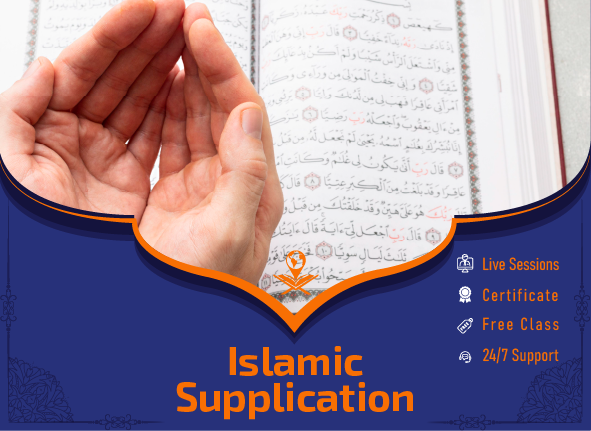
Al Fiqh Course
Course description
The Knowledge of Fiqh is for the sake of the legal Knowledges , as through it one knows the rulings of what is obligatory (واجب), recommended (مستحب), permissible (جائز), disliked (مكروه), and forbidden (حرام), and then the Muslim builds his worship and dealings with people according to the orders of Allah Almighty, and the orders of His Messenger – may Allah bless him and grant him peace -; He wins the happiness of both worlds, this life and next.
the meaning of Al-Fiqh in language: it is understanding. It is said: His Fiqh is strong, meaning: his understanding is good, and from it is the saying of Allah Almighty: {وإن من شيء إلا يسبح بحمده إلا لا تفقهون تسبيحهم}. [الإسراء: 44]، {And there is not a thing that does not glorify Him with His praise, but you do not understand their glorification} [Al-Isra: 44], meaning: you do not understand it.
And the Prophet – may Allah bless him and grant him peace – said: «من يرد الله به خيرا يفقهه في الدين», “Whoever Allah desires good for, He will give him understanding of the religion” .
the meaning of Fiqh in terminology: is the knowledge of practical subsidiary legal rulings based on their detailed evidence.
Sections of Fiqh:
Scholars divided Al-Fiqh into two main sections:
The first section: Fiqh of Worship (فقه العبادات): It includes the practical rulings on the actions of the accountable person related to regulating a person’s relationship with his Lord, such as: purity, prayer, zakat, fasting, Hajj, vows, and others.
The second section: Fiqh of Transactions(فقه المعاملات): It includes the rulings that regulate people’s relationships with each other, whether they are individuals or groups. These rulings are divided into the following:
First: Civil provisions: They are intended to regulate individuals’ financial relationships and preserve rights, and they relate to individuals’ transactions and exchanges, such as sale, lease, mortgage, guarantee, partnership, debt, fulfillment of obligation, and so on.
Second: Family rulings: These are what have recently been called (personal status): they are intended to regulate the relationship of spouses and relatives with each other, and relate to the jurisprudence(Fiqh) of marriage, divorce, alimony, custody, inheritance, endowment, and the like.
Third: Financial and criminal rulings: They are intended to preserve people’s lives, property, honor, and rights. They include punishments and felonies, and relate to the crimes committed by the person charged, and the punishments he deserves for them.
Fourth: Judicial rulings: such as matters of pleadings or civil procedures that are intended to organize procedures to establish justice among people, and they relate to the judiciary, the lawsuit, and methods of proof by testimony, oath, evidence, etc.
Fifth: The provisions of Sharia policy: They include three types:
1 – Constitutional provisions: These are intended to define the relationship of the ruler with the ruled, and to determine the rights and duties of individuals and groups, which are related to the system of government and its principles.
2 – International provisions: They are intended to determine the type of relationship, cooperation and mutual respect between countries. They relate to regulating the relationship of Islamic countries with other countries in peace and war, and the relationship of non-Muslim citizens with the state, and include jihad and treaties.
3 – Economic provisions: They are intended to regulate financial relations between the rich and the poor, and between the state and individuals, and they relate to the financial rights of individuals and their obligations in the financial system, the state’s financial rights and duties, and the organization of treasury resources and expenditures.
The benefit of studying jurisprudence and its benefits:
1 – Obtaining the satisfaction and success of Allah Almighty, and obtaining charity in the hadith: “Whoever Allah desires good for, He will give him understanding of religion”.
2- Organizing the lives of individuals and groups:
Knowing the jurisprudential rulings related to people’s actions helps the Muslim to adhere to those rulings, regarding what is permissible and forbidden, and regulates the lives of individuals and groups with a rational legal approach, far from being influenced by whims and desires.
3- Solving humanitarian problems:
Studying jurisprudential rulings provides Muslims with legitimate solutions to the social and economic problems that societies suffer from, such as the problem of poverty, unemployment, and others.
4- Addressing emerging issues:
Islamic jurisprudence, with its approaches to deducing Sharia rulings, helps the student to know the Sharia rulings for life issues that arise in society, such as the ruling on insurance, test-tube babies, and others.
5 – Confirming the validity of Islam for every time and place:
Islamic jurisprudence, with its ability to address emerging issues, generates in the Muslim a complete conviction in the suitability of Islam for application, in every time and place, and in its ability to absorb the developments of the era and the data of science.
Fiqh terms:
Al Aqidah: It is what an imam adheres to in matters of jurisprudence(Fiqh) based on rules and principles that he sees.
Doctrine (Al-Mazhab): It is the jurisprudential path followed by every imam of ijtihad in their derivation of rulings, in terms of their reliance on texts or opinion.
The four schools of thought: well-known jurisprudential schools of thought that spread in the second century and beyond. They are the school of Imam Abu Hanifa al-Numan, the school of Imam Malik bin Anas, the school of Imam al-Shafi’i, and the school of Imam Ahmad bin Hanbal.
Below is a brief overview of each of them:
– Imam Abu Hanifa, who is: Al-Numan bin Thabit Al-Kufi, Al-Taimi Al-Faqih. He was born in Kufa in the year 80 AH. He was originally from Persia, and the Hanafi school of thought is attributed to him, but it is true that it is not his classification. He died in Iraq in the year 150 AH.
– Imam Malik, who is: Malik bin Anas bin Malik bin Abi Aamer Al-Asbahi, Al-Himyari Al-Madani Abu Abdullah, the imam of Dar Al-Hijra. He was born in the Prophet’s city in the year (93 AH), and to him the Maliki school of thought is attributed. Among his works: Al-Muwatta’, he died in Medina in the year (179 AH). e).
– Imam Al-Shafi’i, who is: Muhammad bin Idris bin Al-Abbas bin Othman Al-Shafi’i Al-Muttalabi Al-Qurashi Abu Abdullah, born in Gaza in the year (150 AH), to whom the Shafi’i school of thought is attributed. Among his works are (The Message) and (The Book of the Mother). He died in Egypt in the year (204 AH).
– Imam Ahmad: Ahmad ibn Muhammad ibn Hanbal Abu Abdullah al-Shaybani al-Waili al-Muhaddith, the imam of the Sunnis, to whom the Hanbali school of thought is attributed. He was born in Baghdad in the year (164 AH). Among his works are (Al-Musnad) and (The Response to the Jahmiyyah and Heretics). He died in Egypt in the year (204 AH).
Dhahiriyya: a well-known jurisprudential doctrine, and it was named in reference to adhering to the apparent meaning of the texts and not considering reasoning and analogy. The founder of this doctrine was Dawud bin Ali Al-Dhahiri, and after him came Ibn Hazm Al-Andalusi, who established this doctrine and laid down its rules.
Obligation: What the Sharia has firmly requested to be done, such that doing it will result in reward, just as its abandoning it will result in punishment.
The obligation-Fard Ayn (فرض عين): what is required of every individual of the taxpayers to do decisively.
The obligation-Fard Kifayah(فرض الكفاية): what was required to be done by all the taxpayers, not by each one of them in particular. Meaning: If enough of the accountable people do it, the sin will be dropped from the rest of the accountable people, and if no one does it, they will all sin and be disobedient to Allah, Lord of the worlds.
The pillar(الركن): It is what a thing cannot be completed without, and it is part of it and included in its reality.
The recommend (المستحب/المندوب): what is requested by the Sharia in a non-decisive manner, that is: what results in reward for doing it, but does not result in punishment for not doing it.
Permissible (الجائز): what is done and left out is the same. Because the Law did not order us to leave it, nor did he order us to do it. Rather, He gave us the freedom of abandonment and action, and made them equal in degree. Therefore, neither doing what is permissible nor abandoning it entails reward or punishment.
Forbidden (الحرام) : What the Sharia demands of us and commands us to strictly abandon, such that abandoning it in compliance with Allah’s command results in reward, and doing it results in punishment.
Makruh (المكروه): What the Lawgiver has asked us to leave in a non-decisive manner, such that if we leave it in compliance with the command of Allah Almighty, we will be rewarded for it, and if we do it, we will not be punished.
Performance (الأداء): The act of worship within the time limited for it by Sharia law.
Al-Qada (القضاء) : the act of worship that is obligatory outside of the time specified for it by Sharia law.
Repeat (التكرار): performing the act of worship on time again to increase the virtue.








